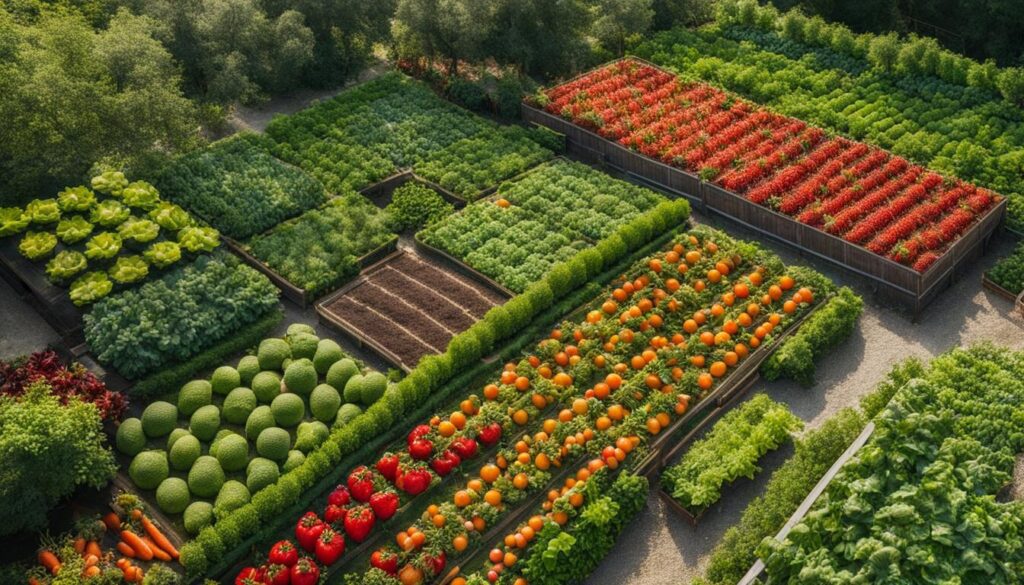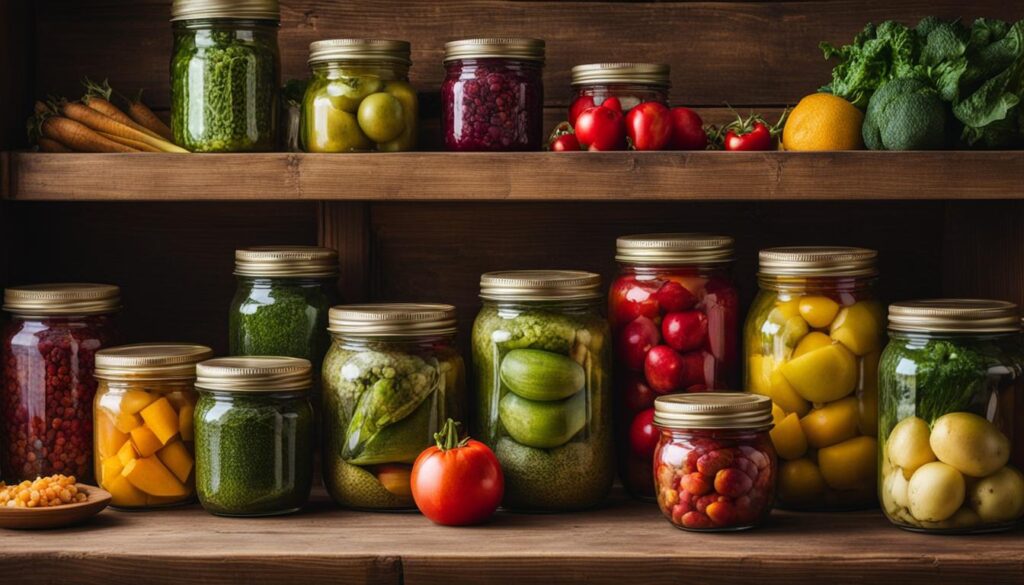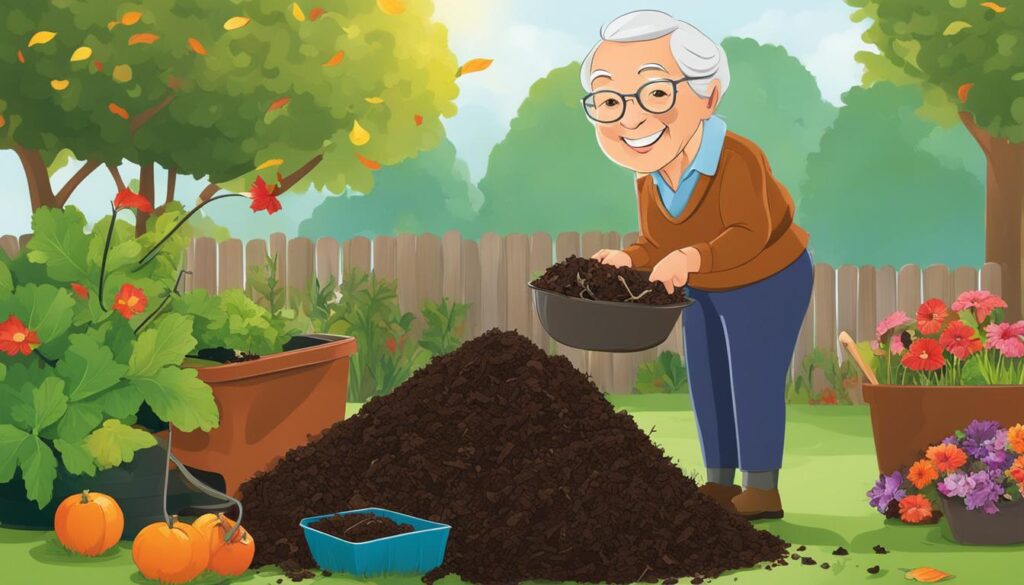Embracing a sustainable and eco-friendly lifestyle is crucial, especially in today’s world where the effects of human activities on the environment are becoming increasingly evident. As we anticipate a projected increase of 2 billion people in the global population within the next three decades, it is imperative to prioritize sustainable living practices.
Self-sufficiency and sustainable living go hand in hand, as they both revolve around reducing consumption and minimizing our impact on the environment. By incorporating self-sufficiency into daily activities like growing your own fruits and vegetables and planning and cooking your meals, you can actively contribute to a more eco-friendly lifestyle, even in your 70s.
Key Takeaways:
- Adopting a sustainable lifestyle is essential for combating the negative effects of human activities on the environment.
- Self-sufficiency and sustainable living intersect in their focus on reducing consumption and minimizing impact.
- Growing your own fruits and vegetables can provide fresh produce while reducing reliance on commercial food production.
- Planning and cooking your meals saves money, reduces waste, and allows for healthier choices.
- Food preservation methods help reduce food waste and reliance on store-bought products.
Grow Your Own Fruits and Vegetables
Growing your own fruits and vegetables is a rewarding and sustainable practice that allows you to take control of your food production while reducing your environmental impact. By embracing self-sufficiency and cultivating your own produce, you can contribute to a more eco-friendly lifestyle at 70.
Whether you have a spacious garden or limited outdoor space, there are various methods to grow your own food. Utilizing garden space for traditional gardening or exploring alternative methods like vertical gardening or container gardening can help maximize yield in limited spaces. Additionally, for those living in apartments or urban areas, growing microgreens indoors is a viable solution for enjoying fresh greens all year round.
“Growing your own fruits and vegetables not only provides you with fresh and delicious produce but also reduces reliance on commercial food production, which often involves the use of harmful pesticides.”
Opting for organic or locally harvested fruits and vegetables is another way to support sustainable living while living in smaller spaces. By choosing organic produce, you can avoid pesticides and support farmers who prioritize eco-friendly farming practices. Similarly, buying local fruits and vegetables reduces transportation emissions and supports the local economy.

Table: Benefits of Growing Your Own Fruits and Vegetables
| Benefits | Description |
|---|---|
| Freshness and Taste | Homegrown produce is often more flavorful and nutritious compared to store-bought alternatives. |
| Reduced Environmental Impact | By growing your own food, you reduce the need for transportation, packaging, and harmful pesticides. |
| Cost Savings | Growing your own food can help save money on grocery bills, especially during the harvest season. |
| Increased Food Security | Having a home garden ensures a steady supply of fresh produce, even during disruptions in the food supply chain. |
| Connection with Nature | Gardening provides an opportunity to spend time outdoors, engage in physical activity, and connect with nature. |
Embracing self-sufficiency by growing your own fruits and vegetables is an empowering and sustainable choice. Not only does it contribute to a healthier lifestyle, but it also allows you to reduce your carbon footprint and enjoy the satisfaction of nurturing your own food.
Plan and Cook Your Meals
When it comes to adopting a sustainable and eco-friendly lifestyle at 70, meal planning and cooking your own meals play a crucial role. Not only does it save you money and reduce package waste, but it also allows you to make healthier choices for yourself and the planet. By taking control of your meals, you can reduce food waste and have more control over the ingredients you consume.
Meal prepping is a great way to ensure that you have nutritious meals throughout the week while minimizing waste. By preparing larger batches of food and portioning them out, you can avoid relying on takeout or processed convenience foods. This not only saves you time and money but also reduces the amount of packaging waste produced.
In addition to meal planning, cooking your own meals gives you the freedom to choose organic, locally sourced ingredients. By supporting local farmers and reducing your carbon footprint from food transportation, you contribute to a more sustainable food system. You can also experiment with plant-based meals or incorporate more vegetarian options into your diet, which have a lower impact on the environment.
Benefits of Meal Planning and Cooking at Home
- Reduced food waste: By planning your meals and using up ingredients, you can significantly reduce the amount of food that goes to waste.
- Healthier choices: Cooking at home allows you to control the quality and quantity of ingredients, making it easier to prioritize nutritious options.
- Saves money: Eating out can be expensive, but preparing meals at home can help you save money in the long run.
- Allows for creativity: Cooking your own meals gives you the opportunity to explore new recipes and flavors, making mealtime more enjoyable.
“By meal prepping, cooking in batches, and making shopping lists, you can reduce food waste and have more control over the ingredients you consume.”
Embracing meal planning and cooking at home is a simple yet impactful way to adopt a sustainable lifestyle in your 70s. In addition to reducing food waste and supporting healthy eating habits, it also allows you to have a positive impact on the environment by choosing eco-friendly ingredients and minimizing packaging waste.
Eco-Friendly Food Preservation: Reducing Waste and Supporting Sustainable Living
Preserving food is an essential aspect of living an eco-friendly lifestyle at 70. By reducing food waste through various preservation methods, you can minimize your environmental impact while also enjoying the benefits of longer-lasting produce. Food preservation not only helps to extend the shelf life of fruits, vegetables, and other perishable items but also contributes to a more sustainable and self-sufficient lifestyle.
One effective method of food preservation is drying. Whether it’s air drying, sun drying, or using a food dehydrator, this technique removes moisture from food, inhibiting the growth of bacteria and mold. Dried fruits, vegetables, and herbs can be stored for months, allowing you to enjoy them throughout the year. Additionally, canning and pickling offer another way to preserve food. By using jars and cans, you can seal and preserve fresh produce with the help of vinegar, sugar, and salt, ensuring that it remains safe to eat for an extended period.
Table
| Preservation Method | Benefits |
|---|---|
| Drying | Extends shelf life, retains flavor and nutritional value |
| Canning | Safe storage for long periods, minimizes food waste |
| Pickling | Preserves taste, adds flavor, and extends shelf life |
| Freezing | Maintains food quality, preserves nutrients |
Another popular method is freezing. Freezing food at its peak freshness prevents spoilage and allows you to enjoy your favorite seasonal produce year-round. Freezing not only preserves the taste and texture of food but also helps to retain its nutrients. By properly packaging and labeling frozen items, you can ensure their quality and avoid waste.
By embracing food preservation techniques, you can not only reduce food waste but also minimize your reliance on store-bought products and packaging. This practice aligns with sustainable living principles, as it reduces the carbon footprint associated with the production, transportation, and disposal of food. Whether it’s drying, canning, pickling, or freezing, food preservation is a valuable tool in promoting self-sufficiency, reducing waste, and embracing an eco-friendly lifestyle at 70.

Practice Composting
Composting is a simple and effective way to reduce organic waste and contribute to a healthier environment. By turning kitchen and yard waste into nutrient-rich material for the soil, you can help divert waste from landfills and support healthy plant growth. Composting is a valuable practice in promoting self-sufficiency and sustainable living.
There are various methods of composting that you can choose from, depending on your space and preferences. One popular method is backyard composting, where you create a compost pile in your yard and allow it to decompose naturally. This method requires a mix of “green” materials, such as kitchen scraps and grass clippings, and “brown” materials, like dry leaves and branches. Regularly turning the compost pile and providing adequate moisture will speed up the decomposition process.
Composting is a simple yet effective way to reduce organic waste and contribute to a healthier environment.
If you don’t have access to an outdoor space, you can still practice composting by using countertop compost bins. These small containers are designed to fit conveniently in your kitchen and are equipped with filters to control odors. Simply collect your kitchen scraps, such as vegetable peels, coffee grounds, and eggshells, and add them to the bin. Once full, transfer the contents to a larger outdoor composting system or donate them to local community gardens.
Composting not only helps reduce waste and support sustainable living but also provides you with nutrient-rich compost to nourish your plants. It improves soil structure, retains moisture, and promotes healthy root development. Whether you have a small backyard or a tiny apartment, you can make a difference by practicing composting as part of your eco-friendly lifestyle at 70.
| Benefits of Composting | How to Get Started |
|---|---|
|
|

Repair and Mend Clothes
Repairing and mending clothes is a sustainable alternative to constantly buying new garments. The fashion industry contributes to environmental damage, and repairing worn-out clothing helps extend their lifespan and reduce textile waste. By learning basic sewing skills and embracing repair over replacement, you can actively contribute to a more sustainable lifestyle. This practice can be applied to other items as well, such as furniture, promoting self-sufficiency and reducing waste.
The fashion industry is known for its fast-paced trends and disposable fashion culture. Repairing and mending clothes allows us to break free from this cycle and reduce waste. It’s a skill that many of our grandparents had, and it’s time to bring it back.
Not only is repairing clothes eco-friendly, but it also saves money in the long run. Instead of constantly buying new clothes, you can save your hard-earned money by fixing what you already have. By extending the lifespan of your garments, you reduce the demand for new clothing, which in turn reduces the resources used in production and the carbon emissions associated with manufacturing, transportation, and disposal.
Repairing and mending clothes can be a creative and rewarding endeavor. It allows you to express your personal style by adding unique touches to your garments. Whether it’s adding patches, embroidery, or altering the fit, repairing clothes gives you the opportunity to make your wardrobe truly one-of-a-kind.
So, the next time you notice a tear or a missing button, instead of tossing the garment aside, consider picking up a needle and thread. By repairing and mending clothes, you not only contribute to a more sustainable lifestyle but also embrace the satisfaction of breathing new life into your favorite pieces.
| Environmental Impact | Sustainable Solution |
|---|---|
| Textile waste | Repairing and mending clothes |
| Resource consumption | Extending the lifespan of garments reduces the demand for new clothing |
| Carbon emissions | Reducing the need for new clothing decreases manufacturing and transportation emissions |
| Water pollution | Reducing the demand for new clothing decreases the use of water-intensive production processes |
Conclusion
Adopting a sustainable and eco-friendly lifestyle in your 70s is a proactive way to contribute to a healthier environment and nurture the planet for future generations. With the global population’s growth and increased resource extraction, it is more important than ever to prioritize sustainable living practices. Incorporating sustainable habits into daily routines can be both fulfilling and beneficial for personal health. For seniors, engaging in activities like gardening, volunteering for environmental initiatives, or participating in community clean-up events not only helps the planet but also keeps the mind and body active. By exploring active lifestyle tips for seniors, individuals can discover new ways to embrace eco-friendly practices while enhancing their overall well-being.
By embracing self-sufficiency, such as growing your own food, preserving food, and practicing composting, you can reduce waste, limit resource consumption, and minimize your carbon footprint. These actions not only have a positive impact on the environment but also promote a sense of self-reliance and independence in your daily life.
In addition, repairing clothes and opting for renewable energy sources play vital roles in sustainable living. By repairing and mending clothes instead of constantly buying new ones, you can extend their lifespan and reduce textile waste. Choosing renewable energy sources, such as solar or wind power, helps decrease reliance on fossil fuels and reduces greenhouse gas emissions.
Embracing an eco-friendly lifestyle at 70 may seem like a small step, but it can have a significant impact on the planet. By incorporating practices like recycling, energy efficiency, and conscious consumption into your daily routine, you can be part of the solution to creating a more sustainable future.
FAQ
How can adopting a sustainable and eco-friendly lifestyle in your 70s contribute to a healthier environment?
By embracing self-sufficiency and sustainable living practices, such as growing your own food, preserving food, and practicing composting, you can reduce waste, limit resource consumption, and minimize your carbon footprint.
What are the benefits of growing your own fruits and vegetables?
Growing your own fruits and vegetables provides fresh produce, reduces reliance on commercial food production, and minimizes the use of harmful pesticides. It also promotes a more sustainable lifestyle.
How can planning and cooking meals help in sustainable living?
Planning and cooking meals saves money, reduces package waste, and allows for healthier choices. By meal prepping, cooking in batches, and making shopping lists, you can reduce food waste and have more control over the ingredients you consume.
What are the methods of food preservation to reduce waste?
Food preservation methods like drying, canning, pickling, freezing, and salting can extend the shelf life of various food items. By preserving food, you can reduce the amount of food ending up in landfills and minimize greenhouse gas emissions.
How does composting contribute to a healthier environment?
Composting turns kitchen and yard waste into nutrient-rich material for the soil, diverting waste from landfills and supporting healthy plant growth. It is a simple yet effective way to reduce organic waste and promote self-sufficiency and sustainable living.
How does repairing and mending clothes contribute to sustainable living?
Repairing and mending clothes helps extend their lifespan, reducing textile waste and the environmental damage caused by the fashion industry. Learning basic sewing skills and opting for repair over replacement promotes a more sustainable lifestyle.


Pingback: Adapting to New Technology and Tools in Your 70s – Straight Fire Money